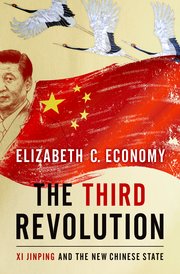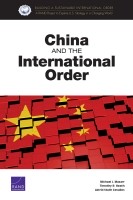 As the U.S. retreats, Beijing is talking more boldly about how it wants to change the global order and assert its own values and interests, according to Elizabeth Economy, the director for Asia studies at the Council on Foreign Relations. President Xi Jinping has put the world on notice: China has its own ideas about how the world should be run and is prepared, as he put it, to “lead in the reform of global governance,” she writes for the Wall Street Journal.
As the U.S. retreats, Beijing is talking more boldly about how it wants to change the global order and assert its own values and interests, according to Elizabeth Economy, the director for Asia studies at the Council on Foreign Relations. President Xi Jinping has put the world on notice: China has its own ideas about how the world should be run and is prepared, as he put it, to “lead in the reform of global governance,” she writes for the Wall Street Journal.
Beijing’s aims to “create a new geostrategic landscape” through its Belt and Road Initiative (BRI) and other tools of sharp power, she adds.
 Nor has Mr. Xi shied away from exporting elements of China’s political model, notes Economy, the author of “The Third Revolution: Xi Jinping and the New Chinese State,” published by Oxford University Press:
Nor has Mr. Xi shied away from exporting elements of China’s political model, notes Economy, the author of “The Third Revolution: Xi Jinping and the New Chinese State,” published by Oxford University Press:
- In at least eight African countries, as well as some in Southeast Asia and Latin America, Chinese officials are training their counterparts in how to manage political stability through propaganda and how to control media and the internet. Reflecting a degree of confidence rare among recent Chinese leaders, Mr. Xi has even proposed that the China model provides a “new option for other countries who want to speed up their development while preserving their independence.”
- Less obvious but just as important are Xi Jinping’s efforts to reform global norms and institutions to reflect Chinese values and priorities. In some cases, these efforts are generally supportive of current practices. The China-led Asian Infrastructure Investment Bank, for example, models its governance standards on those of the World Bank and Asian Development Bank.
 In other instances, however, China uses international institutions to legitimate its own interests. Over the past several years, for example, China has successfully maneuvered to include the Belt and Road Initiative as a formal part of the United Nations’ efforts to achieve its 2030 Agenda for Sustainable Development. This comes despite widespread protests in BRI recipient countries in response to China’s weak environmental, labor and governance standards, as well as the crippling debt that many countries are assuming when they undertake such projects.
In other instances, however, China uses international institutions to legitimate its own interests. Over the past several years, for example, China has successfully maneuvered to include the Belt and Road Initiative as a formal part of the United Nations’ efforts to achieve its 2030 Agenda for Sustainable Development. This comes despite widespread protests in BRI recipient countries in response to China’s weak environmental, labor and governance standards, as well as the crippling debt that many countries are assuming when they undertake such projects.- Finally, Beijing is making significant headway in upending international norms on political and human rights. At the United Nations Human Rights Council, it has worked to diminish the ability of outside actors to criticize a country for human-rights violations. It also promotes a strong vision of internet sovereignty, rejecting data privacy and the free flow of information.
The July 2018 edition of the National Endowment for Democracy’s Journal of Democracy features an essay by the NED’s Christopher Walker on authoritarian sharp power.







